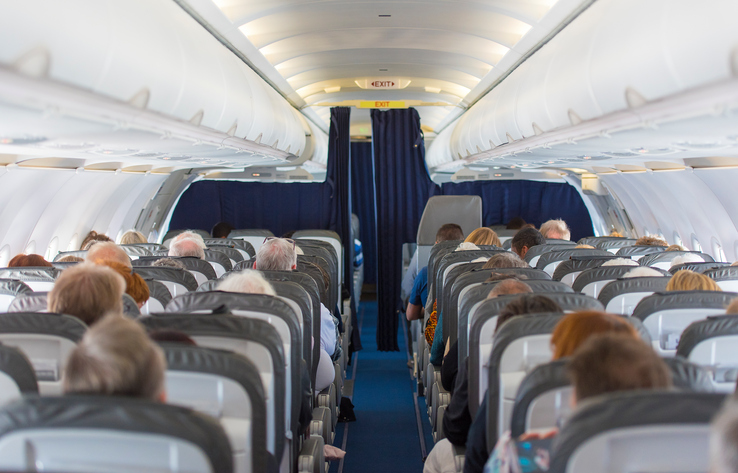The surprising science behind how you pick your airplane seat


A free daily email with the biggest news stories of the day – and the best features from TheWeek.com
You are now subscribed
Your newsletter sign-up was successful
There is a good chance that when you are picking out your seat for a flight, you prefer to sit on the right side of the airplane, a new study reported by the BBC has found. The preference, which was discovered across a group of 32 right-handed people, apparently indicates "our mind's rightward bias in representing the real world," said Dr. Stephen Darling, a psychology lecturer at Queen Margaret University, which carried out the study at Edinburgh University.
In order to rule out the possibility that people just prefer to click one side of their computer screen when choosing a seat on a plane, participants in the study were "presented with seating diagrams with the plane facing either upwards or downwards," said Sergio Della Sala, a human cognitive neuroscience professor at Edinburgh University, who worked on the research. "The result clearly showed that the orientation of the plane made no difference to the preference, with most participants still making an active choice to choose seating on the right of the plane."
The study additionally found that people have a preference "for seats towards the front of the aircraft and a preference to favor window and aisle seats," although anyone who has ever been subjected to a middle seat between strangers likely could have told the researchers that.
The Week
Escape your echo chamber. Get the facts behind the news, plus analysis from multiple perspectives.

Sign up for The Week's Free Newsletters
From our morning news briefing to a weekly Good News Newsletter, get the best of The Week delivered directly to your inbox.
From our morning news briefing to a weekly Good News Newsletter, get the best of The Week delivered directly to your inbox.
Because of the small sample size and the specifics of the people chosen to participate in the study — right-handers between the ages of 21 and 31 — there is still much to learn about rightward bias on airplanes. Would left-handers, for example, have preferred the left side of the aircraft? "These results," the researchers write, "may have implications for our understanding of asymmetries in cognition as well as having potentially important practical implications for airlines."
A free daily email with the biggest news stories of the day – and the best features from TheWeek.com
Jeva Lange was the executive editor at TheWeek.com. She formerly served as The Week's deputy editor and culture critic. She is also a contributor to Screen Slate, and her writing has appeared in The New York Daily News, The Awl, Vice, and Gothamist, among other publications. Jeva lives in New York City. Follow her on Twitter.
-
 How the FCC’s ‘equal time’ rule works
How the FCC’s ‘equal time’ rule worksIn the Spotlight The law is at the heart of the Colbert-CBS conflict
-
 What is the endgame in the DHS shutdown?
What is the endgame in the DHS shutdown?Today’s Big Question Democrats want to rein in ICE’s immigration crackdown
-
 ‘Poor time management isn’t just an inconvenience’
‘Poor time management isn’t just an inconvenience’Instant Opinion Opinion, comment and editorials of the day
-
 Blue Origin launches Mars probes in NASA debut
Blue Origin launches Mars probes in NASA debutSpeed Read The New Glenn rocket is carrying small twin spacecraft toward Mars as part of NASA’s Escapade mission
-
 Dinosaurs were thriving before asteroid, study finds
Dinosaurs were thriving before asteroid, study findsSpeed Read The dinosaurs would not have gone extinct if not for the asteroid
-
 SpaceX breaks Starship losing streak in 10th test
SpaceX breaks Starship losing streak in 10th testspeed read The Starship rocket's test flight was largely successful, deploying eight dummy satellites during its hour in space
-
 Rabbits with 'horns' sighted across Colorado
Rabbits with 'horns' sighted across Coloradospeed read These creatures are infected with the 'mostly harmless' Shope papilloma virus
-
 Lithium shows promise in Alzheimer's study
Lithium shows promise in Alzheimer's studySpeed Read Potential new treatments could use small amounts of the common metal
-
 Scientists discover cause of massive sea star die-off
Scientists discover cause of massive sea star die-offSpeed Read A bacteria related to cholera has been found responsible for the deaths of more than 5 billion sea stars
-
 'Thriving' ecosystem found 30,000 feet undersea
'Thriving' ecosystem found 30,000 feet underseaSpeed Read Researchers discovered communities of creatures living in frigid, pitch-black waters under high pressure
-
 New York plans first nuclear plant in 36 years
New York plans first nuclear plant in 36 yearsSpeed Read The plant, to be constructed somewhere in upstate New York, will produce enough energy to power a million homes
